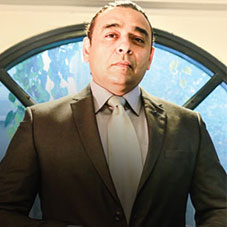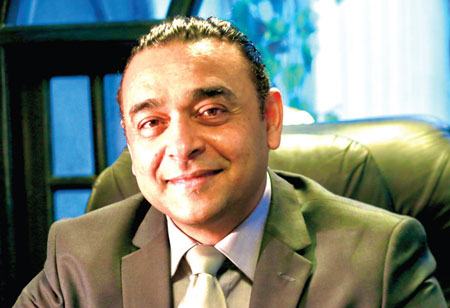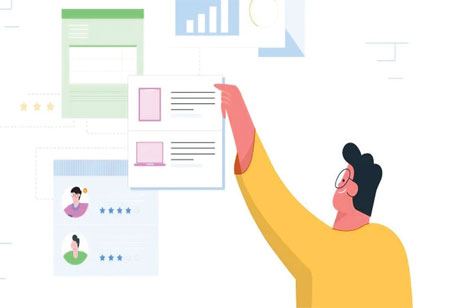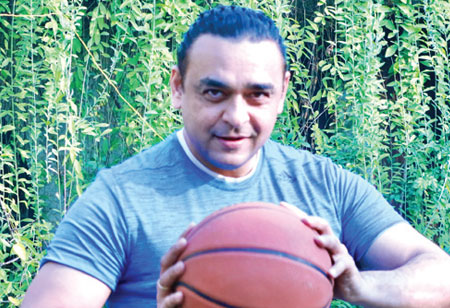
Rakesh Sharrma
Founder
Fueled by curiosity, a keen observation and a scientific approach towards under standing how our world is, Leonardo is history’s most imaginative minds. The magnitude of his genius is unparalleled over the centuries.
"Creating Mobilous From Scratch And Building A World Class Zerocode Platform That Has Been Granted Patents In Several Countries, Truly Has Been A Thrilling Experience"
Rakesh is an engineer and also an MBA, with deep interest in sports and art. With a calm yet determined demeanor easy smiles, loving to play the saxophone, and when the situations demand, display the courage and tenacity to deal with whatever life throws his way. He is meditative and sporty, creative and yet with a practical plan. He never compromised on his creative pursuits. He is as dedicated to his play as to his work. A truly multi dimensional and versatile personality that I came across.

Rakesh Sharrma, the Founder of Mobilous, dreamt something which the VCs from the famous Sandhill Road in Silicon Valley, thought was not possible. He enrolled people into his creative idea and succeeded in building something incredible and unique. He is a true innovator with patents to his name and he is a serial entrepreneur.
It took decades for the IT industry to even reduce the complexity of codes. Rakesh’s technology, now granted patents, makes coding a thing of the past, enabling any apps (mobile or web) to be developed using a drag & drop menu driven AI-powered page builder, without writing a single line of code. Apps could capture any enterprise functions across business domains.
Not writing a single line of code eventually demonstrated its tangible outcomes reducing times by 60 percent time, costs by 50 percent, yet using only one third of resources to develop an App on Mobilous platform, as compared to traditional app development methods.
No wonder the global tech research firms like Gartner are keen to assess Mobilous as a potential disruptor to their Magic Quadrant of the Rapid App Development Platform for Lo Code/No Code as Mobilous prepares to unleash its technology into the global market. To unfold more of this exciting story, I recently got in touch with Rakesh, and he was happy to share his views for our readers. Below is an excerpt of our interview with him.
What does no code or zero code really mean?
Coding is currently at the heart of ‘every thing’ deeptech with the goal to create a useful software application using any programming language and create a lengthy, complex set of commands & instructions that that execute a logic. But over the past few decades, the tech realm has managed to reduce the number of codes, coining the terminology, Lowcode while also improving the efficiency of codes and speed of execution. Low code basically implies a set of forms and easier syntax that can be pre loaded and added to building a program logic. This reduces a third of your coding time.
Living amidst a dynamic era where technology obsolescence is outpacing the speed of innovation, the question of what's next is of paramount importance. That’s where Zero code comes into play. Mobilous' patented zero code technology disrupts the current and brings a paradigm shift in programming, as it ensures that one does not need to write even a single line of code anymore to develop an application. With zero code, all one has to do is look up the menu and drag & drop UI parts/actions together and build the logic. This means that one does not need a team of developers building complex codes for each mobile platform to develop a solution over many months.Be it developing an android or iOS application, zero code technology enables one to become agnostic to the programming language as well as the app quality and the experience.
Typically it takes at least a month for the development team to figure out the execution plan, and how to build the logic before starting development. While with Mobilous’zero code platform, it only takes a single person and a few hours to build an application.
Referring to some real numbers of our customers, even the support resource cost has dropped by 80 percent. And that really is transformational.
This is truly a ground breaking platform. Could you tell us more details about the unique propositions the app provides?
Mobilous’mult experience development (MXDP)platform offers development teams an integrated set of front end, drag & drop menu driven tools with deep customizations to capture any complex process logic, in addition to back end services that further enable the front end services all without writing a single line of code.Our platform enables distributed and scalable development both in teams and architecture, for fitfor purpose apps across digital touch points and interaction modalities, like iOS, Android, and Web HTML. Once the development is complete, the Mobilous platform generates a native.ipa file (Apple) and.apk file (Android) respectively. Parallelly, it generates a web URL to open the app on any browsers. Unlike hybrid apps which use third party software wrappers, Mobilous apps are native and use no third party wrappers, thus, saving 30-50MB wrt file sizes.

It takes 60 percent less time, costs 50 percent less, and takes only one third of resources to develop an App on Mobilous compared to traditional app development.
From an organizational standpoint, what is their initial response towards this ground breaking concept? How do you deal with the skepticism due to its novelty?
From an organization’s point of view, the first thought about zero code is whether we can do a proof of concept for them and validate their concerns. Today, when I engage with an organization, I can confidently tell them that there will be no conflict. I don’t say "Just try it", I would say "Just do it, tangible ROI will follow immediately”. We have enough validations in the market from everyone from CEOs to CIOs and technology heads as our clients have really performed well across the KPIs committed. It is a safe bet that a pilot project will be the trigger to transform the whole organization. Moreover, EY and Deloitte have performed VAPT tests for security assessment for one of our clients and approved the app for release.

We believe that zero programming is the future of mitigating tech obsolescence through quick turnarounds and avoiding ever growing tech gaps. Digital trans formation using Zero coding is the fastest and the cheapest way to sustain in this rapidly changing technology dependent environment. With the pandemic, the need for such a platform has been well demonstrated by several research firms like Forbe, Gartner, Forrester and others.
Could you tell us about a case study where in organizations have used this platform to roll out zero code applications for their businesses?
We are already working with a Fortune 500 company. In fact, it’s interesting how we were introduced to this opportunity. We were brought in to replace their very large partner that couldn’t satisfy the requirements after almost completing phase one of the project. We started from scratch and eventually ended up building a comprehensive marketing and sales solution for theirretail and distribution network. This included every facet starting from leads & order management to stocks, inventory, sales invoicing, and much more, enabling them to respond to regional opportunities in a sophisticated manner. For instance, during Ganesh Chaturthi, they can provide their consumers in Western India with additional discount schemes and offers. This enhanced their visibility of the function and improved their capability to forecast.
Today, we have clients across segments in Manufacturing, Retail, Logistics, BFSI and soon to add Pharma.
Where did it all come together for you?
The launch of the first iPhone in 2007 and the subsequent success of Apple’s App Store was a turning point for Mobility. Since then, with a vast cross section of people using apps, it looked like a logical progression that it would encompass the enterprise domain in no time.
In 2010, with the launch of iOS and Android when only Microsoft operating systems existed in the enterprise space, I started to believe that apps built on iOS and Android platforms would eventually be used by the employees too. It was clear that solutions/ apps will need to operate on a multi platform land scape. That’s when the idea of Code less Digital Transformation cropped
This is truly a ground breaking platform. Could you tell us more details about the unique propositions the app provides?
Mobilous’mult experience development (MXDP)platform offers development teams an integrated set of front end, drag & drop menu driven tools with deep customizations to capture any complex process logic, in addition to back end services that further enable the front end services all without writing a single line of code.Our platform enables distributed and scalable development both in teams and architecture, for fitfor purpose apps across digital touch points and interaction modalities, like iOS, Android, and Web HTML. Once the development is complete, the Mobilous platform generates a native.ipa file (Apple) and.apk file (Android) respectively. Parallelly, it generates a web URL to open the app on any browsers. Unlike hybrid apps which use third party software wrappers, Mobilous apps are native and use no third party wrappers, thus, saving 30-50MB wrt file sizes.

It takes 60 percent less time, costs 50 percent less, and takes only one third of resources to develop an App on Mobilous compared to traditional app development.
We believe that zero programming is the future of mitigating tech obsolescence through quick turn arounds and avoiding ever growing tech gaps
From an organizational standpoint, what is their initial response towards this ground breaking concept? How do you deal with the skepticism due to its novelty?
From an organization’s point of view, the first thought about zero code is whether we can do a proof of concept for them and validate their concerns. Today, when I engage with an organization, I can confidently tell them that there will be no conflict. I don’t say "Just try it", I would say "Just do it, tangible ROI will follow immediately”. We have enough validations in the market from everyone from CEOs to CIOs and technology heads as our clients have really performed well across the KPIs committed. It is a safe bet that a pilot project will be the trigger to transform the whole organization. Moreover, EY and Deloitte have performed VAPT tests for security assessment for one of our clients and approved the app for release.

We believe that zero programming is the future of mitigating tech obsolescence through quick turnarounds and avoiding ever growing tech gaps. Digital trans formation using Zero coding is the fastest and the cheapest way to sustain in this rapidly changing technology dependent environment. With the pandemic, the need for such a platform has been well demonstrated by several research firms like Forbe, Gartner, Forrester and others.
Could you tell us about a case study where in organizations have used this platform to roll out zero code applications for their businesses?
We are already working with a Fortune 500 company. In fact, it’s interesting how we were introduced to this opportunity. We were brought in to replace their very large partner that couldn’t satisfy the requirements after almost completing phase one of the project. We started from scratch and eventually ended up building a comprehensive marketing and sales solution for theirretail and distribution network. This included every facet starting from leads & order management to stocks, inventory, sales invoicing, and much more, enabling them to respond to regional opportunities in a sophisticated manner. For instance, during Ganesh Chaturthi, they can provide their consumers in Western India with additional discount schemes and offers. This enhanced their visibility of the function and improved their capability to forecast.
Today, we have clients across segments in Manufacturing, Retail, Logistics, BFSI and soon to add Pharma.
Where did it all come together for you?
The launch of the first iPhone in 2007 and the subsequent success of Apple’s App Store was a turning point for Mobility. Since then, with a vast cross section of people using apps, it looked like a logical progression that it would encompass the enterprise domain in no time.
In 2010, with the launch of iOS and Android when only Microsoft operating systems existed in the enterprise space, I started to believe that apps built on iOS and Android platforms would eventually be used by the employees too. It was clear that solutions/ apps will need to operate on a multi platform land scape. That’s when the idea of Code less Digital Transformation cropped
in my mind. I was working with HP at that time after they acquired my second startup, ‘Opelin’. I convinced one of HP’s partners in Japan, Akira, to join me as a co-founder. So that’s how I brought my vision into reality.
We had to destroy a lot of codes since even iOS and Android platforms were evolving. It delayed our development, we finally applied for patents in the US, Japan, and India. We literally had to argue at the patent offices, to prove our innovation as original with no prior arts, overcoming influencers and volumes of related documentation. Finally, when we were granted the patents, we popped out into the lime light. I now envision transforming India’s global IT reputation from a service provider to a Technology provider and an innovation hub. Mobilous today is positioned as the only company globally that holds the patent for the Zero-code mobile app development platform and is waiting on the periphery to make it into the Low-Code/No-Code Magic Quadrant of Gartner as we garner the requisite threshold revenue.

Looking back, which are the milestones that have bestowed you with utmost satisfaction Both personally and professionally?
The journey teaches you during your lows and highs. You need to derive a valuable life and understand that change is the only constant. I am also proud of the value systems that my kids have imbibed, seeing me start companies, including my struggles, risks and failures, and finally seeing me succeed with consistency, discipline and hard work. My spiritual journey at Ananda has also been an important milestone personally that helped me overcome stress during trying times at multiple startups. And not to forget, my saxophone lessons have transcended me into a new realm of creativity that helps me focus on new ideas.
Leaving a very large company like Tata Steel, starting my own company at the young age of 30, way back in early 2000s, making an anecdote out of my life as an entrepreneur, and building patented technology products in a country that’s not considered a technical innovation hub have been a fantastic journey on mile stones. Furthermore, traveling to more than 50 countries, building multicultural teams signing up international partner ships, and engaging into a multitude of cultural, social, and business etiquettes have been an unparalleled experience.
Above all, starting Mobilous from zero and building a world class zero code platform that has been granted patents in several countries has been a journey quite fulfilling.
Going forward, what are your goals? What are the areas that you wish to invest in?
I am a huge space enthusiast. I wish to invest my time in Space and Defense in the future everything driven by a Go Green/Go Sonic mindset. I plan to exit Mobilous in the next three years. Moving forward, I would like to identify like minded co-founders to share my ideas and build concept notes. I also wish to support start ups in my country with my hands on experiences to help them shorten the learning or knowledge with respect to phases in their journey.
In the light of your strong experience across the domain of digitaltransformation and AI enabled technologies, what advice would you give to the aspiring leaders in this domain?
The valuation game without real revenue is a myth and does not represent trueeconomic outcomes, especially with an enterprise product like Mobilous don’t chase them. Valuation is a natural outcome when you build revenues on the strength of your product or service, delivering a positive EBITA. This is a true basis to build a global enterprise.
Also, I would tell them that AI is a buzzword, but it means nothing without context.Build context before enabling AI in your products. This will help you create true value. On the other hand, digital transformation is a compulsory enabler to productivity and ROI. Speed of transformation must surpass technical obsolescence otherwise, it’s just an expensive futile exercise.
Rakesh Sharrma, Founder, Mobilous
An Electrical & Electronics Engineer turned IT entrepreneur, Rakesh, who started his career at an early age, boasts a professional experience of 30 years. He has been an expert in building technology startups purely on Cloud since 2003, developing validated business models, scaling up revenues, and selling them to Fortune 100 companies. He has successfully exited two ventures already Opelin and eCircle, and has eight patents under his name. He also holds extensive market experience in the US, EU, SE Asia, India, and Japan building markets/partnerships for new innovations. Rakesh founded his third startup Mobilous,which has developed a patented technology, a drag & drop cloud based AI engine. His ability to build and recruit highly talented cross functional and multinational teams and manage challenging strategic partnerships is also unparalleled.
Hobbies:Triathlon, Basketball, Saxophone, Skiing, and Deep Sea Diving
Favorite Cuisine:Japanese
Favorite Book:Autobiography of a Yogi, Atlas Shrugged, and Discovery of India
Favorite Travel Destination:
London and Tokyo
We had to destroy a lot of codes since even iOS and Android platforms were evolving. It delayed our development, we finally applied for patents in the US, Japan, and India. We literally had to argue at the patent offices, to prove our innovation as original with no prior arts, overcoming influencers and volumes of related documentation. Finally, when we were granted the patents, we popped out into the lime light. I now envision transforming India’s global IT reputation from a service provider to a Technology provider and an innovation hub. Mobilous today is positioned as the only company globally that holds the patent for the Zero-code mobile app development platform and is waiting on the periphery to make it into the Low-Code/No-Code Magic Quadrant of Gartner as we garner the requisite threshold revenue.

Looking back, which are the milestones that have bestowed you with utmost satisfaction Both personally and professionally?
The journey teaches you during your lows and highs. You need to derive a valuable life and understand that change is the only constant. I am also proud of the value systems that my kids have imbibed, seeing me start companies, including my struggles, risks and failures, and finally seeing me succeed with consistency, discipline and hard work. My spiritual journey at Ananda has also been an important milestone personally that helped me overcome stress during trying times at multiple startups. And not to forget, my saxophone lessons have transcended me into a new realm of creativity that helps me focus on new ideas.
Leaving a very large company like Tata Steel, starting my own company at the young age of 30, way back in early 2000s, making an anecdote out of my life as an entrepreneur, and building patented technology products in a country that’s not considered a technical innovation hub have been a fantastic journey on mile stones. Furthermore, traveling to more than 50 countries, building multicultural teams signing up international partner ships, and engaging into a multitude of cultural, social, and business etiquettes have been an unparalleled experience.
Above all, starting Mobilous from zero and building a world class zero code platform that has been granted patents in several countries has been a journey quite fulfilling.
Going forward, what are your goals? What are the areas that you wish to invest in?
I am a huge space enthusiast. I wish to invest my time in Space and Defense in the future everything driven by a Go Green/Go Sonic mindset. I plan to exit Mobilous in the next three years. Moving forward, I would like to identify like minded co-founders to share my ideas and build concept notes. I also wish to support start ups in my country with my hands on experiences to help them shorten the learning or knowledge with respect to phases in their journey.
In the light of your strong experience across the domain of digitaltransformation and AI enabled technologies, what advice would you give to the aspiring leaders in this domain?
The valuation game without real revenue is a myth and does not represent trueeconomic outcomes, especially with an enterprise product like Mobilous don’t chase them. Valuation is a natural outcome when you build revenues on the strength of your product or service, delivering a positive EBITA. This is a true basis to build a global enterprise.
Also, I would tell them that AI is a buzzword, but it means nothing without context.Build context before enabling AI in your products. This will help you create true value. On the other hand, digital transformation is a compulsory enabler to productivity and ROI. Speed of transformation must surpass technical obsolescence otherwise, it’s just an expensive futile exercise.
Rakesh Sharrma, Founder, Mobilous
An Electrical & Electronics Engineer turned IT entrepreneur, Rakesh, who started his career at an early age, boasts a professional experience of 30 years. He has been an expert in building technology startups purely on Cloud since 2003, developing validated business models, scaling up revenues, and selling them to Fortune 100 companies. He has successfully exited two ventures already Opelin and eCircle, and has eight patents under his name. He also holds extensive market experience in the US, EU, SE Asia, India, and Japan building markets/partnerships for new innovations. Rakesh founded his third startup Mobilous,which has developed a patented technology, a drag & drop cloud based AI engine. His ability to build and recruit highly talented cross functional and multinational teams and manage challenging strategic partnerships is also unparalleled.
Hobbies:Triathlon, Basketball, Saxophone, Skiing, and Deep Sea Diving
Favorite Cuisine:Japanese
Favorite Book:Autobiography of a Yogi, Atlas Shrugged, and Discovery of India
Favorite Travel Destination:
London and Tokyo

